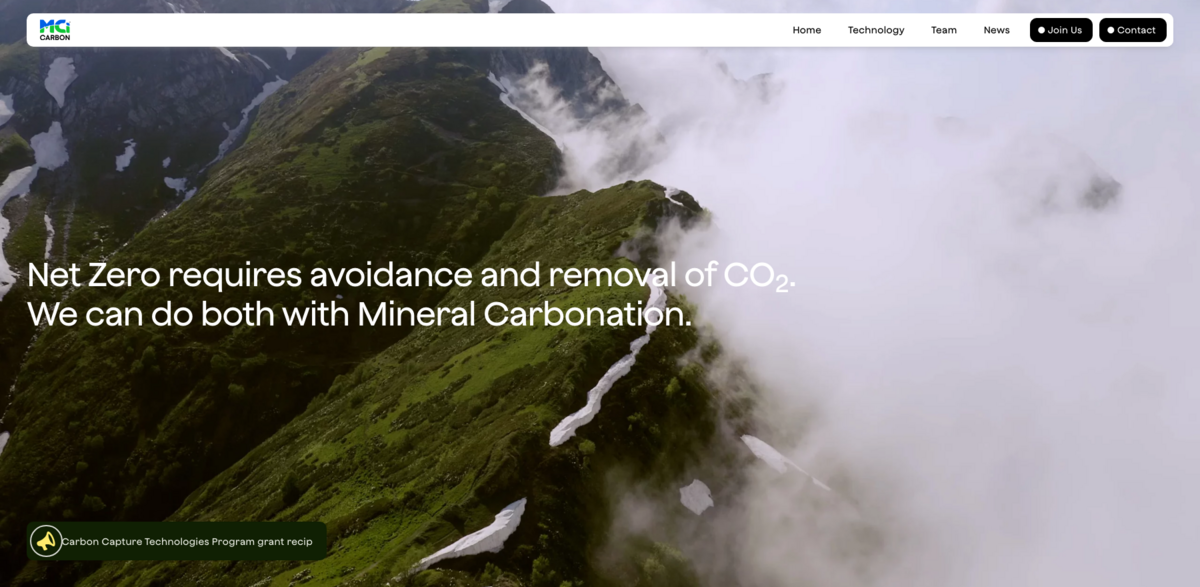What the Project Is
NET ZERO REQUIRES AVOIDANCE AND REMOVAL OF CO2. WE CAN DO BOTH WITH MINERAL CARBONATION. MCi Carbon is a global cleantech based in Australia, transforming CO2 emissions into valuable materials for industry. Their scalable technology platform integrates point source carbon capture with large industrial emission sources, including flue gases and low-purity CO2. This efficient and versatile solution transforms captured carbon into saleable materials. The process is low-pressure and low-temperature, combining CO2 with alkaline sources of magnesium and calcium – including industrial byproducts like slags, tailings, and ultramafic rock such as serpentinite. It’s a groundbreaking way to put CO2 to work…
Main Benefit
The mission is simple – profitably decarbonise global industries by turning CO2 emissions into valuable products. Key figures and facts include:
- 15% of the world’s emissions come from cement and steel.
- A bold mission to lock away 1 billion tonnes of CO2 by 2040.
- Utilisation of industrial byproducts to create precipitated magnesium carbonate, precipitated calcium carbonate, and silica.
- MITSUBISHI UBE CEMENT CORPORATION (MUCC) invests USD $5 MILLION, alongside ITOCHU CORPORATION through a collaboration agreement.
- MCi Carbon awarded a $14.5m Carbon Capture Technologies Program grant to accelerate the mission.
Decarbonisation for Global Industries
The core mission is to profitably decarbonise global industries by turning CO2 emissions into valuable products that feed directly into construction and manufacturing supply chains. Industries such as cement, steel, mining, chemicals, and manufacturing together emit over 6 billion tonnes of CO2 every year, making a cutting challenge indeed. With a focus on hard-to-abate sectors – those not solely reliant upon carbon pricing, offsets, or subsidies – MCi Carbon uses CO2 as a resource. This approach not only cuts emissions but also delivers breakthrough economics, where the energy required is minimised and the value of the products created exceeds the overall cost of avoiding or removing emissions.
Scalable and Innovative Technology
The technology is designed with flexibility in mind. By integrating point source carbon capture with emissions from diverse industrial sources, MCi Carbon’s technology offers both short-term CO2 avoidance and long-term atmospheric carbon removal. The process combines CO2 with alkaline sources to produce materials such as low-carbon concrete, paper, glass, plastics, and paints. It has proven to be efficient and versatile – a real game changer for global scaling. The ultimate flexibility of the technology opens up a vast addressable market that includes both emissions abatement customers and new low carbon and negative emissions materials manufacturers… It’s innovation in action.
Strong Industry Collaborations
Partnerships and strategic investments play a vital role in the project’s success. MCi Carbon officially launched in partnership with Orica and the University of Newcastle to conduct a research pilot program. The unveiling of its technology quickly engaged with first customers who recognised its enormous potential. In 2021, the company raised its first cornerstone industry investment from Itochu Corp and secured a $14.6m grant from the Australian Government Carbon Capture Utilisation Storage Development Fund to build an industrial scale demonstration plant in Newcastle. Expansion of the team with experts from Orica, including Dr. Mark Rayson and researchers from the University of Newcastle, has further solidified its credibility.
Transforming CO2 into Valuable Materials
The wide range of output materials includes precipitated magnesium carbonate, precipitated calcium carbonate, and silica – each designed for practical applications in construction and manufacturing sectors. The products can be directly incorporated into low-carbon concrete, paper, glass, plastics, and paints, thereby not only reducing the CO2 footprint but also creating saleable and sustainable products. By turning emissions into a resource, MCi Carbon offers a profitable, permanent, safe, and sustainable decarbonisation pathway for hard-to-abate industries. The approach is both environmentally impactful and commercially attractive, emphasizing that decarbonisation can go hand-in-hand with industrial progress.
Project Impact
- SDG 7: Affordable and Clean Energy
- SDG 9: Industry, Innovation and Infrastructure
- SDG 12: Responsible Consumption and Production
- SDG 13: Climate Action
- SDG 11: Sustainable Cities and Communities
Future Outlook and Global Decarbonisation Pathway
The future of industrial decarbonisation is taking shape with the construction of ‘Myrtle’ having begun in 2023, and commissioning expected to start in mid 2024. MCi Carbon remains at the forefront of carbon capture innovation with a clear aim to tackle both short-term CO2 avoidance and long-term atmospheric removal. This Australian-developed carbon engineering technology provides a decarbonisation solution that is not reliant on carbon pricing, offsets, or subsidies – truly a flexible and scalable answer for global industries. With continued industry collaborations, strategic investments, and rapid customer engagement, the project paves a sustainable and profitable pathway forward, turning today’s CO2 into tomorrow’s valuable resource…


















